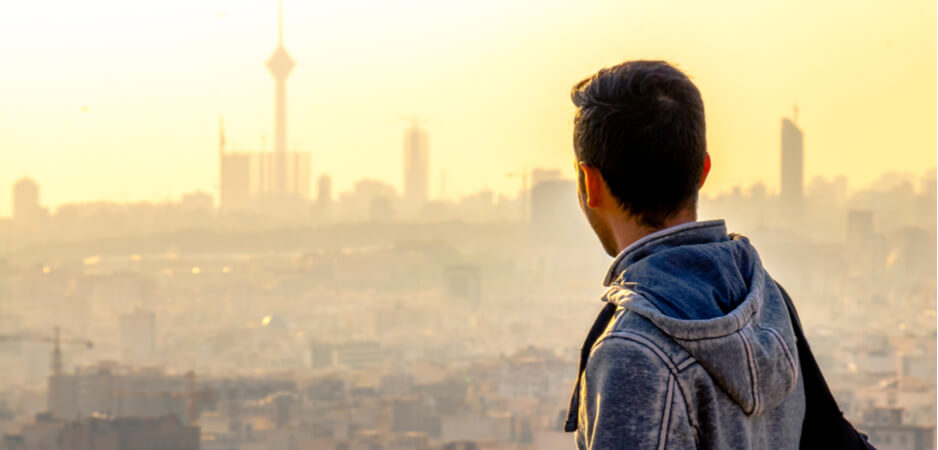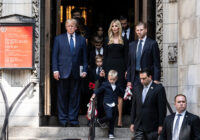In this edition of The Interview, Fair Observer talks to renowned American poet and literary scholar Charles Bernstein.
Strangulating economic sanctions are no novelty for the Iranian people, who have borne the brunt of international embargoes for almost four decades now. The United States introduced its first set of punitive measures against Iran shortly after the 1979 hostage crisis. After that tragic episode, the United States added to its sanctions on Iran on multiple occasions, rendering it a pariah state disconnected from the global banking, financial, energy and transportation sectors.
The latest round of sanctions by the United States targeting Iran were announced in August and November 2018, sparking panic among Iranians, unprecedented fluctuations in the exchange market and the closedown of hundreds of enterprises and businesses across the country.
The two nations are now embroiled in a bitter standoff over Iran’s nuclear program, ballistic missiles development and regional influence. Washington accuses Tehran of destabilizing the Middle East by propping up militant groups in different countries throughout the region and posing a threat to Israel.
The Iranian government finds itself with few reliable partners and allies these days to be able to weather the storm of the gruelling sanctions. Nevertheless, the sanctions have been widely criticized by both European governments and non-governmental actors for the detrimental impact they have on the lives of ordinary citizens, including a restricted supply of food and medicine to millions of Iranians.
In January, France, Germany and the United Kingdom set up a special-purpose vehicle called Instrument in Support of Trade Exchanges (INSTEX) to facilitate non-dollar trade between Iran and European companies and bypass the US secondary sanctions. INSTEX will primarily cover the sectors that are most pivotal to the Iranian people, namely pharmaceutical and medical devices, and agricultural goods.
On January 22, a group of distinguished American poets and literary figures gathered at the Busboys and Poets in Washington, DC, to recite poetry and read statements against the US sanctions and in solidarity with the Iranian people. Prominent American poet, essayist and literary scholar Charles Bernstein — who was awarded Yale’s prestigious Bollingen Prize for American Poetry that night — was one of them.
In this edition of The Interview, Fair Observer talks to Charles Bernstein about the US sanctions on Iran and the future of Iran-US relations.
Kourosh Ziabari: Tensions between Iran and the United States are running high, and Washington seems to be hell-bent on devastating Iran’s economy through sanctions and its “maximum pressure” strategy. Are you concerned that the current tensions might lead to more unfortunate developments such as a new war in the Middle East?
Charles Bernstein: Yes. I share this fear, along with government leaders in Europe and indeed with the US Democratic Party leadership, so to say this is just to endorse mainstream thinking on the matter.
Ziabari: President Donald Trump’s decertification of the Iran nuclear deal was a precursor to the reinstatement of hard-hitting economic sanctions. The measures are already affecting Iran’s economy, and some observers say they will take a heavy toll on the ordinary citizens. What do you think about the human cost of the US sanctions?
Bernstein: The renewal of sanctions by the US government is playing to the extreme right in the US, Iran and Israel, and that means against the best interests — cultural, political and economic — of the people in those countries. It is hurting the people in Iran, and no doubt hurting the least powerful people the most. The renewed sanctions have the consequence — blowback — of bolstering the hard-line policies of the radical illiberalism and religious fanaticism of the current Iranian government.
Ziabari: You recently took part in an event hosted by Busboys and Poets and recited your works in protest against the sanctions. Do you think artists, academics and activists can have an impact on the US government’s aggressive approach toward Iran and even moderate it?
Bernstein: Our poets’ reading — I was joined by Pierre Joris, Rod Smith, Leslie Bumstead and others — will have no direct effect on US government policies. However, the reading might have alerted journalists to cover the effects of the sanctions on ordinary Iranians. Unfortunately, I don’t think it did. The suffering of the Iranian people as a result of US sanctions has received far too little attention in the US press. We were able to bring some attention to this on social media. However, the greatest effect of our reading was expressing solidarity with those affected by the sanctions: Iranians can hear that some Americans care about the effect our government’s brutal actions have on them. And even if this is the only effect, it made the reading worthwhile.
Poets against Iran sanctions https://t.co/QOg9wknqwV
— Negar Mortazavi (@NegarMortazavi) January 23, 2019
Ziabari: One of the contested decisions of President Trump concerning Iran was imposing a travel ban against its citizens, as well as some other Muslim-majority countries. Does this decision serve the national interest of the United States?
Bernstein: The Trump administration’s travel ban was racist and meant to rally support from the president’s xenophobic and Islamophobic followers. The ban resonates with the Christianification of American laws and policies. I oppose all global bans against residents of any country, as for example travel bans against Israeli or American academics because of the policies of their governments.
Ziabari: Many good steps were taken toward a reconciliation between Iran and the United States under President Obama. Do you think President Trump’s Iran policy has undone these achievements?
Bernstein: Big Lie Trump — BLT, as I call him — is certainly destructive of traditional liberal alliances in Europe, and he has given aid and comfort to dictators around the world. In this sense, [Ayatollah Ali] Khamenei is his kind of guy. Trump, who was elected despite losing the popular vote, acts more like a despotic “supreme leader” than the head of a democracy. However, speaking of pre-BLT US foreign policy, I was wary of many of those long-time policies as well. BLT and his Republican enablers have made things far worse. Ironically, that now makes it harder to be critical of traditional Democratic, State Department, CIA policies.
Ziabari: Is the United States after a regime change in Iran and trying to install a puppet regime, as some conservative advocates of the Iranian government purport?
Bernstein: I’d love to see a regime change in Iran — toward a democracy that fosters dissent, a free press and cultural and religious freedom. As for US goals, I would insist on the longer view on this. Since World War II, US meddling in has Iraq undermined democratic movements and the will of people while fostering totalitarianism, both directly and as a consequence of failed policies. We see in the US complicity in overthrowing [Mohammad] Mossadegh and support the shah. You can’t undo that history. We now find ourselves facing another US policy that ultimately gives cover for hawkish actions on the part of the Iranian government — actions that, like the sanctions, have monstrously negative effects for the Iranian people, who suffer under the yoke of their own oppressive government and the brutality of renewed US sanctions.
If the US didn’t put itself forward as the boogeyman, the Iranian government would have to manufacture this US menace — in order to justify their totalitarianism. They have a lot of experience doing this.
Ziabari: What changes in Iran’s foreign policy could persuade the United States to adopt a more friendly approach toward Tehran? Overall, do you think it’s possible to eliminate the hostilities between the two nations and rebuild relations?
Bernstein: Poets like me — who work in unconventional forms — are not part of national political discussion. American journalists do not seek out my views on such matters. The poem I read at Busboys and Poets event, “Our United Fates,” collected in Near/Miss, was written for the Trump inauguration and was commissioned by National Public Radio. But my poem was not aired. My guess is that NRP refused to broadcast the poem they commissioned because they recognized I was saying something and, worse, saying it an unfamiliar, indeed challenging way. My guess, from listening to what they do broadcast, is that NPR would have preferred a blandly anecdotal, feel-good poem that, while recognizing problems, ultimately celebrated American values.
Ziabari: There are many Iranians living, studying and working in the United States. How dynamic and proactive is this community in creating links of friendship between the people of Iran and America?
Bernstein: What Sepideh Jodeyri did with our reading was let me touch the hem of the garment that connects me with that community. She provided a space of sanctuary, in the way that poetry can be such a space. What I want is sanctuary, not sanctions.
The views expressed in this article are the author’s own and do not necessarily reflect Fair Observer’s editorial policy.
Support Fair Observer
We rely on your support for our independence, diversity and quality.
For more than 10 years, Fair Observer has been free, fair and independent. No billionaire owns us, no advertisers control us. We are a reader-supported nonprofit. Unlike many other publications, we keep our content free for readers regardless of where they live or whether they can afford to pay. We have no paywalls and no ads.
In the post-truth era of fake news, echo chambers and filter bubbles, we publish a plurality of perspectives from around the world. Anyone can publish with us, but everyone goes through a rigorous editorial process. So, you get fact-checked, well-reasoned content instead of noise.
We publish 2,500+ voices from 90+ countries. We also conduct education and training programs
on subjects ranging from digital media and journalism to writing and critical thinking. This
doesn’t come cheap. Servers, editors, trainers and web developers cost
money.
Please consider supporting us on a regular basis as a recurring donor or a
sustaining member.
Will you support FO’s journalism?
We rely on your support for our independence, diversity and quality.






